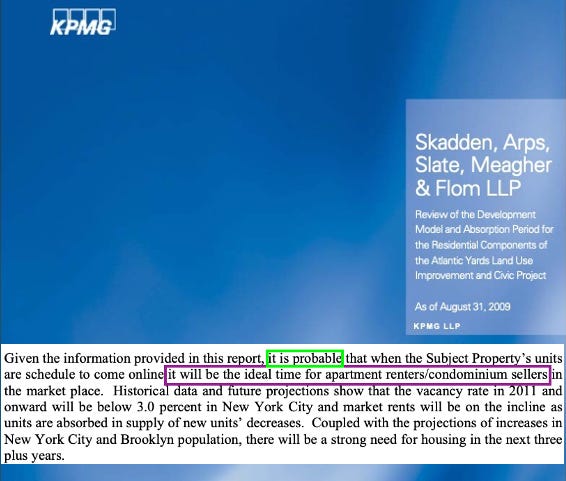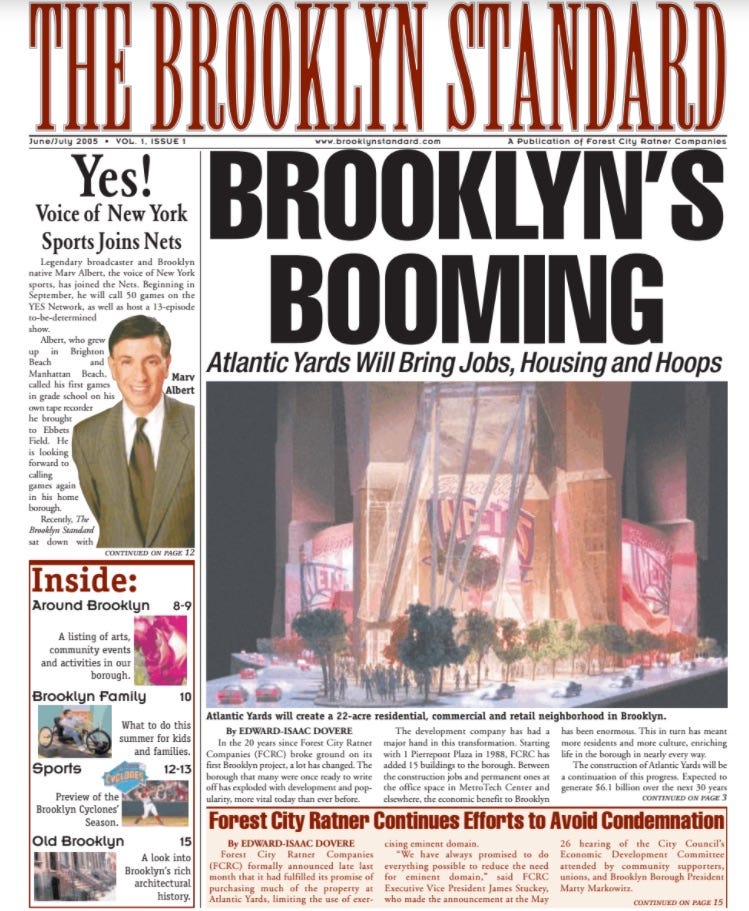Bi-Weekly Digest: Who's to Blame for Unworkable (?) Plan? Was the Arena a "Linchpin" as Promised?
No, "politicians and activists" didn't doom Atlantic Yards. Nor did the Barclays Center catalyze project benefits. BSE Global keeps pushing, in Brooklyn & beyond. Atlantic Yards lessons for the BMT.
This digest offers a way to keep up with my Atlantic Yards/Pacific Park Report blog and my other coverage in this newsletter and elsewhere.
Two big recent headlines are Atlantic Yards-adjacent.
Insurgent democratic socialist Assemblymember Zohran Mamdani, who campaigned enthusiastically and embraced affordability, won a surprisingly clear vote in the Democratic primary for Mayor over grim, tarnished, car-dependent Andrew Cuomo—a victory that should be solidified after ranked-choice voting calculations conclude this week.
While Atlantic Yards is a state project, a new mayor can offer not just coordination but financial assistance, via direct subsidies and housing bonds.
So it will be interesting to see if construction unions and Cirrus Real Estate, who are behind a pending plan to take over the remaining project, line up behind tarnished Mayor Eric Adams (who last year announced the Cirrus workforce housing plan), running as an independent, sound out Mamdani, or back a potential Cuomo candidacy as an independent.
As I’ve written. Mamdani, like all his rivals except Comptroller Brad Lander (who cross-endorsed Mamdani, and could have a future in a Mamdani administration), didn’t seem to know much about Atlantic Yards. He should start.
I hope all candidates recognize that the project poses not simply an issue of "build, baby, build," but rather questions of governmental oversight, developer responsibility, and the interplay between governmental accommodation, financial viability, and community impacts.
BMT plan postponed, in flux
I’ve written periodically about the ambitious plans for the Brooklyn Marine Terminal, a 122-acre site centered in Red Hook. See my June 9 article, In Brooklyn Marine Terminal Discussion, Atlantic Yards is the Elephant in the Room.
Well, as Gothamist reported June 27, Vote on massive Brooklyn waterfront redevelopment plan postponed… again, marking “at least the third time that New York City’s Economic Development Corporation has rescheduled the vote due to insufficient support from members of a task force deciding the project’s fate.”
It’s curious how they’ve been playing etch-a-sketch with the plan, cutting housing from some 12,000 to 7,700 (as shown below) to 6,000 and now promising 40% of the units aimed at low-income households averaging 60% of Area Median Income.
(That translates, under current estimates—which will change—to one-bedroom units at $1,822 for individuals earning up to $68,040 and two-person households earning up to $77,760.)

Such dramatic changes in a short time raise questions about the underlying assumptions, and models.
Even before that, three urban planners (including Ron Shiffman, a member of the Atlantic Yards Community Development Corporation), wrote an op-ed in Crain’s warning, “now is not the time to rush into a redevelopment plan that bypasses proper planning channels and local laws.”
Process questions, deal questions
State Senator Andrew Gounardes, a member of the task force, said he’d gotten commitments for (unspecified) state funding for the project, but asked the New York City Economic Development Corporation to delay the vote, using the time to “push the NYC Department of Transportation for stronger commitments on congestion mitigation and traffic improvements.”
Though some would like the Task Force to say no, “I am deeply concerned about the implications of walking away and starting over,” stated Gounardes. That’s the “getting to yes” posture many elected officials—who face various pressures from city and state entities, and perhaps mindfulness to donors—unsurprisingly pursue.
By contrast, Brooklyn Borough President Antonio Reynoso, in a June 27 Brooklyn Daily Eagle essay, Brooklyn’s last working waterfront deserves better, warned:
But a few more weeks is not enough time to meaningfully alter a plan that insists on misunderstanding the opportunity in front of us. In fact, such a short extension would simply be a concession that EDC would prefer to play politics rather than work together to put forward a real plan for Brooklyn’s future of waterborne freight and waterfront manufacturing.
The Atlantic Yards lesson?
In response to criticism (as per the Crain’s op-ed) that the use of the state General Project Plan rather than the city’s land-use process “has been disastrous,” given Atlantic Yards’ unfulfilled commitments, Gounardes promised “a commitment that the newly formed BMT Development Corporation will have approval and enforcement authority over all RFPs and contracts to avoid the mistakes of the Atlantic Yards project.”
The devil, as they say, is in the details, which are partly fleshed out on p. 47 here, but deserve more than three weeks for debate before the vote. How exactly would that mayoral-controlled entity enforce such contracts? Is there money up front for promised public benefits if economic and political cycles upend optimistic plans? What are the best-case and worst-case scenarios?
This deserves much public discussion, especially if it advances and then is seen as a template for a future Atlantic Yards governance entity.
From this newsletter
June 20: If Affordable Housing Over Railyards Doesn't Work, Are "Politicians & Activists" to Blame? Columnist at The Real Deal criticizes unrealistic goals, but New York State backed developer Ratner's unwise (and renegotiated) Atlantic Yards plans with dubious reports.

Compounding erroneous assumptions, KPMG failed to anticipate the impact of the Downtown Brooklyn rezoning, which delivered numerous competing market-rate units, without the infrastructure costs associated with Atlantic Yards.
June 26: Is the Barclays Center the "Linchpin" of Atlantic Yards? No, and That Matters. The arena and team helped get the project approved, but didn't leverage the jobs and housing. Decoupling ownership sacrificed cross-subsidization.
The slogan “Jobs, Housing, and Hoops” would appear on t-shirts and buttons. It was a package deal—or was it?
Today, though, the state could step in, requiring payments by arena operator BSE Global in return for making the arena plaza permanent.
From Atlantic Yards/Pacific Park Report
June 17: BSE Global, which also owns the Nets and Liberty, plans to transform shuttered Modell's building across from arena into the Brooklyn Basketball Training Center, by fall. "Community-first" is their business slogan.
Note the suspiciously traffic-free image in the official handout, looking across Flatbush Avenue.
June 18: Abundance vs. baloney: Resorts World (with Cirrus, the firm behind the emerging plan for Atlantic Yards) claims to be delivering "workforce housing... starting now!"
The link, however, goes just to a vague press release, which cited “up to 50,000 jobs,” with no financial commitments or timelines. Might this have to do with the ongoing effort to secure a new casino license? So let’s be wary of claims of “abundance”—the new buzzword—without skepticism.
June 19: To meet city housing goals, do we simply have to build bigger? What about infrastructure (and the region)? That’s relevant to the future of Atlantic Yards. London, for example, has done much better, with a new train line.
June 19: Elected officials, including three from Congress, join Council Member Crystal Hudson in asking Gov. Kathy Hochul and Empire State Development to collect damages for absent Atlantic Yards affordable housing.
Getting the Congressional reps involved is unusual. That doesn’t mean it will get anywhere.
June 21: So Type.Set.Brooklyn, BSE Global's new "digital first global media brand," relies on "Brooklyn's intrinsic values"? I have some doubts.
The idea that a brand can reflect, as the press release claimed, "Brooklyn's intrinsic values - uninhibited authenticity, relentless hustle, diverse community and audacious creativity and self-expression," is a stretch. A couple of the new video series are intriguing, if not the stuff of a big success, while a few others are not.
June 23: In 2025 Forbes Global 2000, Greenland Holdings, parent of Greenland USA, continues drop, to #931 from #891. It was once #307. Losses drag stock price down.
June 24: As we await a new mayor, remember columnist Errol Louis's 2010 warning: the bill for the railyard platform might "get handed to the city or state a decade from now.” Or, perhaps, the cost will be finessed by giving away more bulk—free vertical land. Stay tuned.
June 25: BSE Global's Planet Brooklyn festival announces lineup for end-of-August shows at the Barclays Center and the Brooklyn Paramount, starting with a Trinidadian star. Tickets start at $76 and $60.
The festival is booked by the founders of AfroPunk. Stay tuned for another press release—more headlines!—when the free music series at the Brooklyn Academy of Music is announced.
June 27: With democratic socialist Zohran Mamdani the (likely) Democratic Mayoral nominee, what might that mean for Atlantic Yards? Will construction unions back Adams, or Cuomo? Or switch?
June 27: A shooting at Carlton Avenue and Pacific Street seems unrelated to Atlantic Yards, though it was very near 535 Carlton.
June 28: The Brooklyn Nets had five first-round draft picks. The results didn't impress. So 2025-26 likely will be another rebuilding year. Expect more promotion about “Brooklyn.”









Norman, thanks for bringing your hard-won knowledge and ideas to my part of the world (the BMT). Both the process and the specifics are wrong for the landscape and the people of Red Hook and Columbia Street Waterfront.